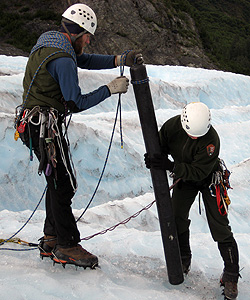To what degree do scientists concur about rapid climate change and the role human activity has in causing it?
Climate Question 2 Answer

NPS photo
The Intergovernmental Panel on Climate Change (IPCC), which includes thousands of scientists with the greatest experience in climate change research and which publishes the authoritative scientific assessments of climate change, has concluded that emissions from human activities are causing climate change.
When faced with a question, scientists first develop a "hypothesis" and then subject their hypothesis to rigorous experimentation and observation. Multiple proven hypotheses may be collected into a "theory," which summarizes several experiments and observations. Theories are lines of thinking that scientist accept as true, but scientists always make room for an exception, or for science to come along with new discoveries that can disprove previously accepted hypotheses and theories. A theory need not have 100% agreement to be valid, and theories seldom achieve unanimous approval. Scientists may disagree about certain aspects of climate change, but this is part of the scientific process, not a sign that a theory is inaccurate. As new facts come to light, science adjusts its theory. A "law" is a predicted set of observations with no significant exceptions. Theories do not "grow up" to be laws once they are proven. In fact, scientists are still refining Newton's laws of gravity.
Let's be clear. Climate change is happening all around us, and human activities are accelerating it. The evidence is overwhelming, and the theory of global warming is sound. The Intergovernmental Panel on Climate Change (IPCC), which conducted the survey above, consists of thousands of scientists from all over the world who specialize in difference aspects of climate science. A separate study by the National Academy of the Sciences drew the same conclusions.
As a scientific agency, the National Park Service has learned to adapt our management practices to new evidence as it becomes available. For example, we used to manage forest fires by putting them out as quickly as possible. We now realize that fire is a natural process, and this process must remain active in fire-dependent ecosystems to promote healthy forests, and healthy forests release less carbon into the atmosphere in the long run.
We acknowledge that uncertainty remains over how fast and how much the temperature will increase. Nor are we certain about rainfall levels and the number or severity of storms. Some scientists think that the outcomes will slowly increase like turning a dial; while other scientists think it will be more like flipping a switch. Despite the uncertainty, we believe it far riskier to do nothing. We will move forward with the best science we have today. Our mission demands that we do so.
Last updated: October 10, 2019
